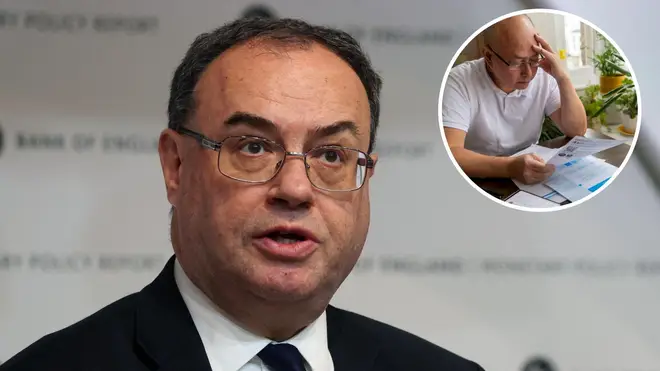
Nick Ferrari 7am - 10am
23 February 2022, 14:12 | Updated: 23 February 2022, 14:30

Bank of England governor Andrew Bailey, who came under fire for suggesting people shouldn't ask for pay rises in the cost of living crisis, has again sparked anger when he "couldn't remember" his £575,000 salary.
Mr Bailey was trying to justify his calls for introducing pay restraint to curb inflation during a Treasury committee of MPs on Wednesday, when he fumbled over his sky-high salary.
He was grilled by Dame Angela Eagle MP, who asked: "Can you tell me what the median care worker wage was? It's £9.01 an hour and 77% care workers paid below Living Wage Foundation rate. What was your pay over the same period?"
"Substantially higher," Mr Bailey replied.
"What was it, governor?"
"Um, its somewhere over £500,000 - I can't tell you exactly what it was, I don't carry that around in my head."
The Labour MP hit back that he was paid £575,538 in the year from March 2020, including his pension.
She argued that workers had suffered the longest pay squeeze in 200 years, and asked when they could catch up if not now.
Read more: 'Don't ask for a big pay rise': Fury at message from 500k Bank boss to struggling Brits
Read more: Masks off: TfL announces end of face coverings on Tube from Thursday

'Let them live for one day with a person that's trying to feed their kids!'
People have erupted into anger over his comments, which have been slammed as being "out of touch".
Positive Money UK, a not-for-profit advocacy group, said he earns "almost £300 an hour" while care workers earn just £9, asking "is this why the Bank of England is out of touch?"
Sharon Graham, general secretary of Unite the Union, also criticised the governor, saying he "blew a hole" in the bank's pretence to be neutral when he "targeted workers' pay packets instead of company bosses and inflated profits".
"Workers didn’t cause galloping inflation or the energy crisis so why should they pay for it?" she asked.
She wrote on Twitter: "Unite will always seek pay deals that reflect the true cost of living because anything else is a wage cut."
The Bank of England governor Andrew Bailey has told workers not to ask for pay rises.
— Positive Money (@PositiveMoneyUK) February 23, 2022
He earns almost £300 an hour.
Care workers earn £9 an hour.
Is this why the Bank of England is out of touch?@angelaeagle this morning 👇 pic.twitter.com/6hOdtFb9fY
The governor then sought to defend controversial comments he made earlier this month urging workers not to ask for big pay rises to counter soaring inflation, saying that companies also need to think twice about raising prices significantly to help cool inflation pressures.
Earlier this month he said the UK needed to see "some moderation of wage rises" - something he conceded was "painful" - in order to prevent inflation from "spreading".
"What we can do is try to prevent inflation spreading and becoming more engrained in the system," Mr Bailey told the BBC.
When asked if he was telling people not to ask for "too high" a pay rise, he said: "Broadly, yes."
Read more: Heavy snow and wind to batter UK as weather warnings issued days after storm chaos
Andrew Bailey blew a hole in the Bank of England's pretence to be neutral when he targeted workers' pay packets instead of company bosses and inflated profits. Workers didn’t cause galloping inflation or the energy crisis so why should they pay for it?https://t.co/0JdxFMAgdb
— Sharon Graham (@UniteSharon) February 23, 2022
Mr Bailey has been criticised for his comments, that come at a time when the UK is suffering a growing cost of living crisis.
He told the Treasury committee that the so-called second round effects of the energy-led rise in living costs were his "biggest concern" and, if realised, would hurt the least well-off the most and could lead to even higher interest rates.
Ms Eagle called on Mr Bailey to visit a care home, with workers in the sector being paid £9.01 an hour on average.

UK's soaring inflation caused by 'perfect storm' of conditions
She asked what his view was on bank bonuses, adding: "We're in the middle of a huge bonanza for banker bonus payouts."
He said: "The same point holds about restraint for everybody."
On executive pay and bonuses more widely in the UK, he added: "When you're thinking about it, please reflect on the economic situation we're in with this very big economic shock coming in from outside.
"My big concern is that the least well off will come off worse in this process if we don't have some process of thought and restraint."